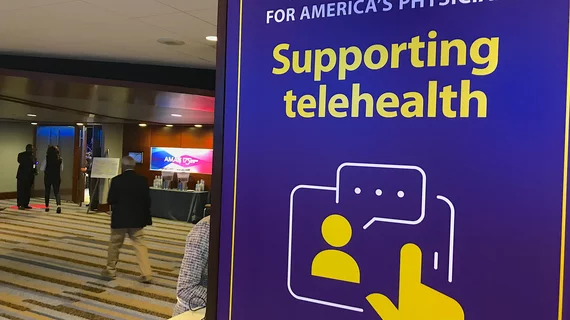AMA will aggressively support permanent telemedicine reimbursement
The American Medical Association (AMA) said it will lobby for an indefinite extension of Medicare reimbursement for telemedicine services and fight the Dec. 31, 2024, sunset date when Medicare plans to cease reimbursement for these services.
Telemedicine was not reimbursed by Medicare prior to the COVID-19 pandemic. This significantly hampered wide-scale adoption of the technology that could enable physicians to see greater numbers of patient more efficiently than with less inconvenience to patients than office visits. The Centers for Medicare and Medicaid Services (CMS) rapidly changed its policy to cover telemedicine during the 2020 COVID-19 public health emergency in efforts to limit in person contact while still enabling patients access to providers. Overnight, the percentage of telehealth usage skyrocketed during the pandemic.
While these numbers have since declined rapidly as COVID subsided over the past couple years, nearly 70% of physicians want to continue providing telemedicine services, the AMA said, based on surveys of its members.
“Paying for telemedicine services means greater convenience for patients and less need to use petroleum-powered vehicles for patients’ and doctors’ transit from their homes to physicians’ offices,” explained the a resolution introduced by the Missouri State Medical Association at the 2024 AMA House of Delegates (HOD) meeting.
The resolution, adopted by the HOD, calls for the AMA/Specialty Society Relative Value Scale (RVS) Update Committee (more commonly known as the RUC), to evaluate telemedicine and determined a relative value unit (RVU) value. The RUC committee is dedicated to describing the resources required to provide physician services which CMS considers in developing RVUs.
The resolution also requested that RVU determinations be made with recommendations for higher reimbursement rates for in-person office visits because of the higher costs related to maintaining brick and mortar facilities.
Demand for telemedicine still high
An AMA survey of its physicians found 74.4% reported that telehealth was used in their medical practices in 2022, which is nearly three times the number from 2018. Videoconferencing with patients was the main driver for the change, according to the findings of an AMA Policy Research Perspectives report on telehealth. Just 14.3% of physicians had the ability to use telehealth to video conference with patients in 2018, compared with 66.3% of physicians in 2022.
“While the immediate need due to the COVID-19 pandemic has passed, telehealth and especially remote visits with patients, has become part of the mainstream way in which physicians deliver care,” wrote Carol K. Kane, PhD, the AMA’s director of economics and health policy research, in the report.
There have been numerous calls by the AMA and other medical societies since 2022 to maintain telemedicine as a tool for faster routine visits, low-acuity questions, and to help patients who otherwise would need to travel long distances or could not afford to do in-person visits.

